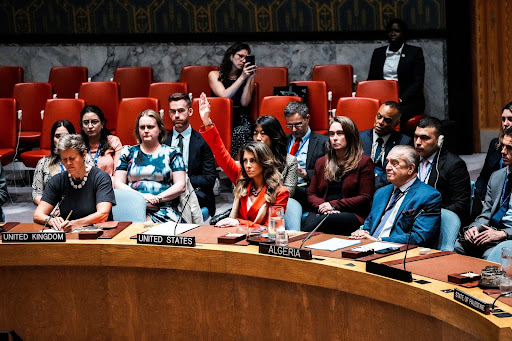In a vote on Sept. 18, amongst the Security Council of the United Nations to call for the “immediate, unconditional and permanent ceasefire” in Gaza, the United States made its sixth veto against the decision. The U.S. acted solely, going against the votes of the other 14 representatives in the council.
The U.S. can make this decision, as it is one of the five permanent council members with the right to veto in the UN, the other four being China, France, Russian Federation, and the United Kingdom. This status is granted to certain countries for the sake of protecting the general peace of the world.
The proposed ceasefire draft included demands in exchange for the release of all hostages held by the Palestinian Militant Group, Hamas, as well as a lift on Israel’s restrictions on humanitarian aid meant for the population of Gaza and its unhindered distribution.
U.S. diplomat Morgan Ortagus made a statement to clarify the reasoning behind the U.S.’s decision in front of the council.
“It wrongly legitimizes the false narratives benefiting Hamas, which have sadly found currency in this council. Council members ignored when the United States made clear that this resolution was unacceptable,” she said.
The draft was put in place by the UN’s 10 non-permanent members, who continue to seek an immediate and lasting ceasefire, including Denmark, Slovenia, Greece and Pakistan.
The recent conflict in Gaza began on Oct. 7, 2023, after Hamas and other militant groups unexpectedly attacked Israel, leading to the deaths of over a reported 1,200 people, most of whom were civilians. The Palestinian militants who carried out the assault also took approximately 200 Israeli hostages.
In response, Israel launched their own counter-offensive strikes in an attempt to eradicate Hamas within Gaza. Since then, fighting has persisted over the span of the last two years, with sporadic and brief clashes with other Middle Eastern Countries such as Lebanon and Iran.
A brief ceasefire was reached in January of 2025, where hostages were being released by Hamas and Palestinian prisoners released by Israel in exchange. Unfortunately, it was short-lived due to accusations of agreement violations on both ends, which ultimately resumed air strikes and the blocking of aid and energy by March.
The total death toll since the beginning of the 2023 conflict has been recently reported to have passed 67,000, according to CNN World and the Palestinian health ministry.
The ongoing battle between involved forces has caused widespread outrage on social media platforms internationally, also inspiring in-person demonstrations of protest against its lack of non-combatant discrimination, calling it a genocide of Palestinian civilians.
Additionally, many Americans, in particular, disagree with the U.S. government’s provision of over $12.5 billion in foreign aid to Israel since the start of October 2023..
“It makes me feel disappointed that we are supporting a genocide that is clearly unfolding before our eyes. It is sad to imagine that our support could have made the difference,” said an anonymous A&T student when asked their stance on the United States’ role in Israel’s operations.
731 days later, fatality numbers continue to rise, not just because of Israel’s military attacks, but from starvation and disease that stem from the lack of food and essential resources being allowed into the strip for civilians.
Hamas has recently released a statement claiming that they are willing to release Israeli hostages while seeking to negotiate a deal based on a few points included in the proposed peace plan from the U.S.






